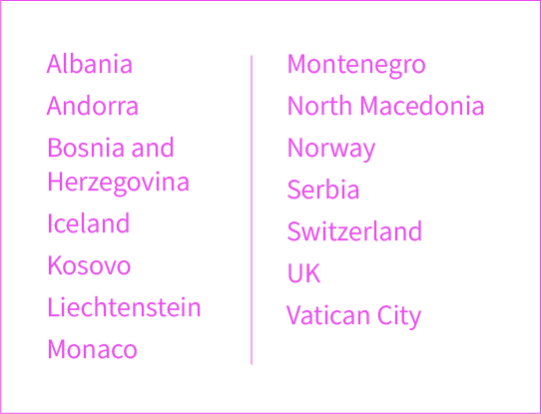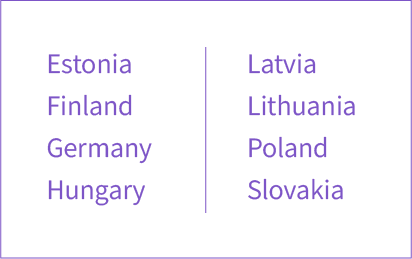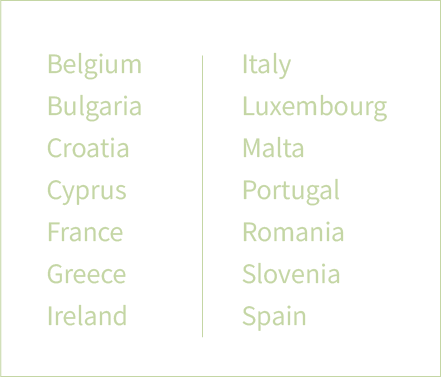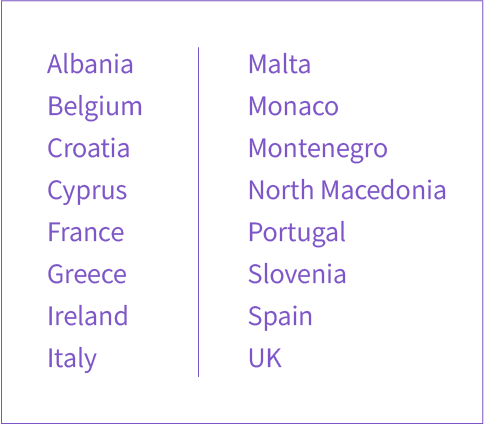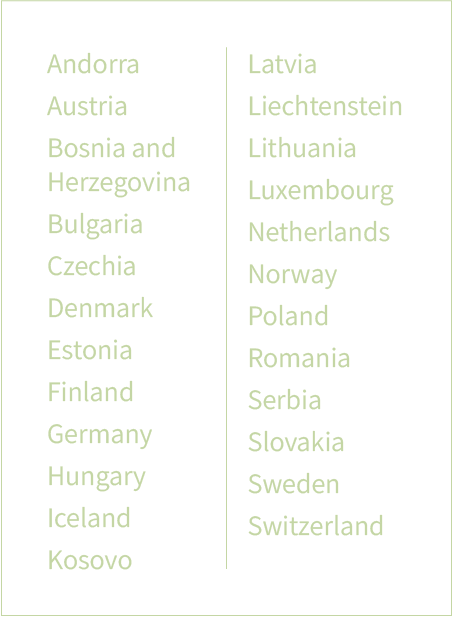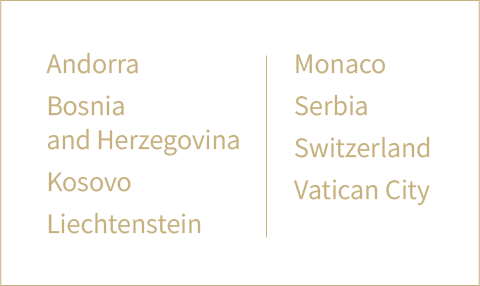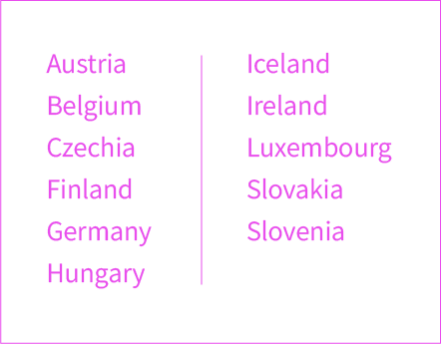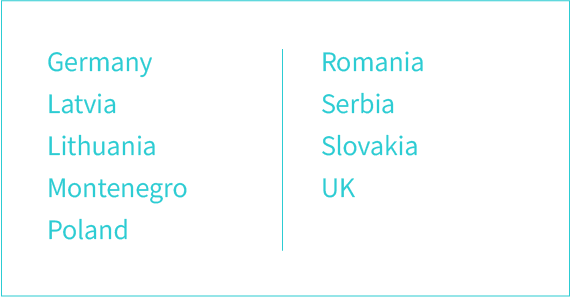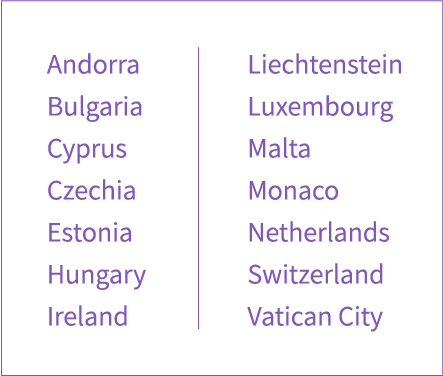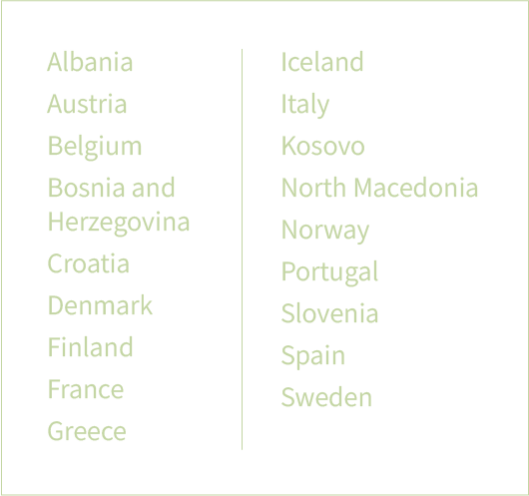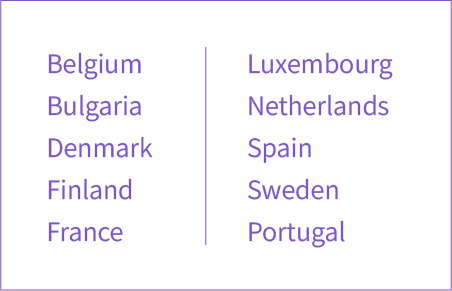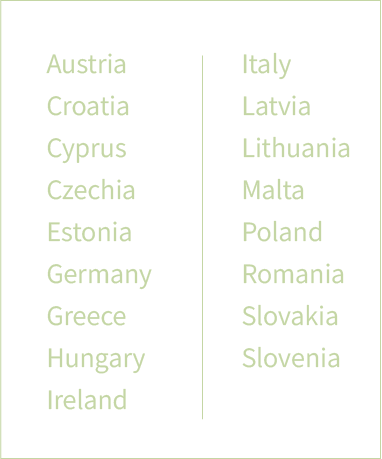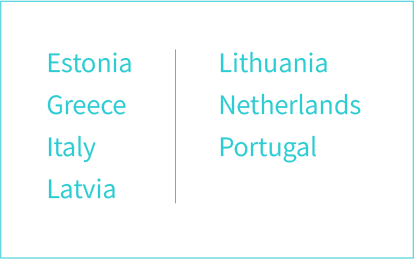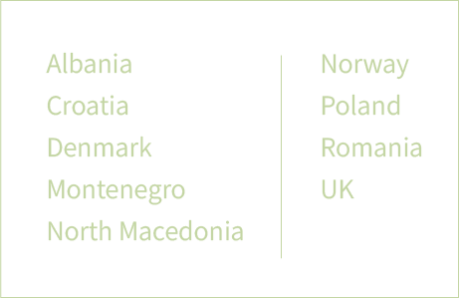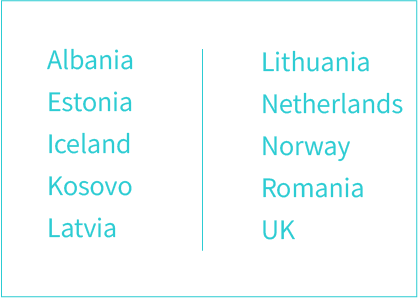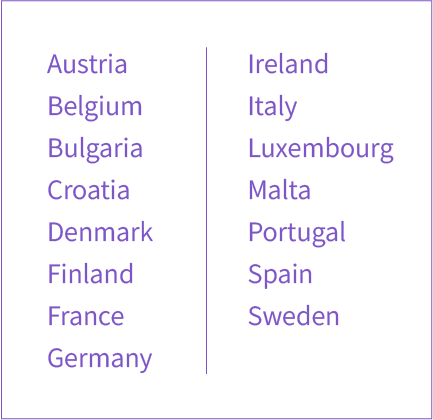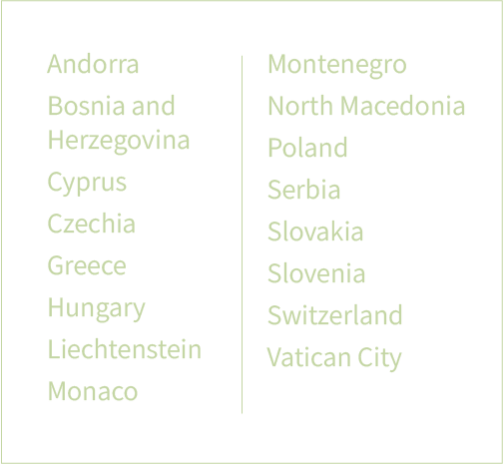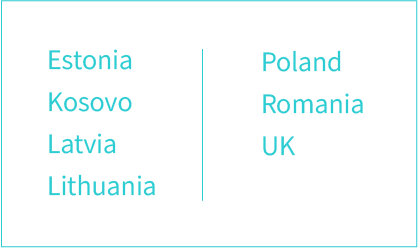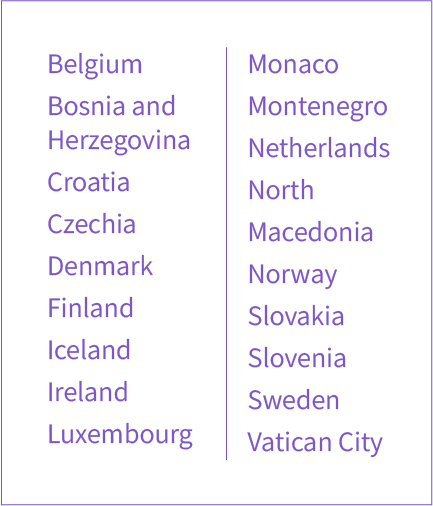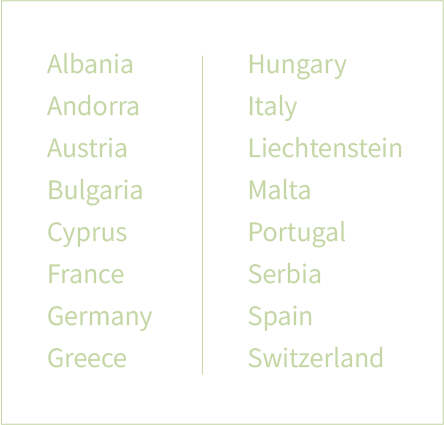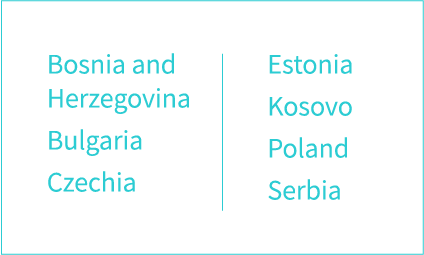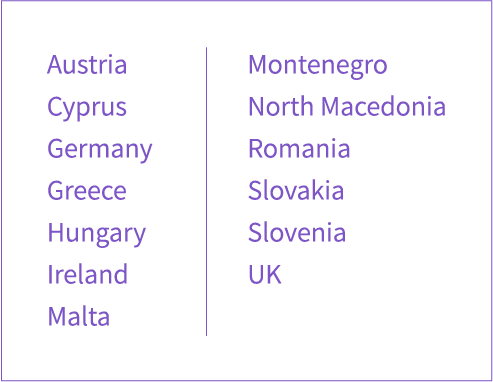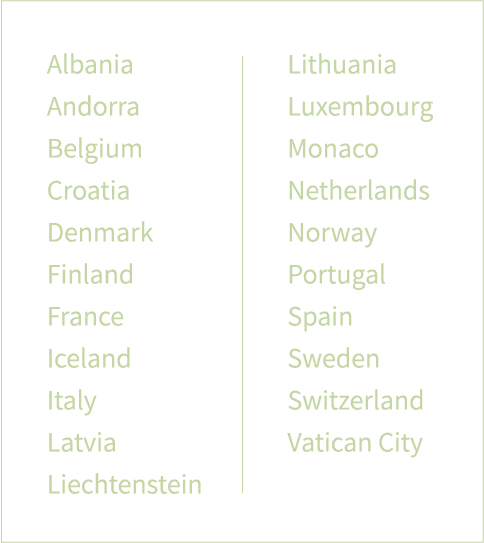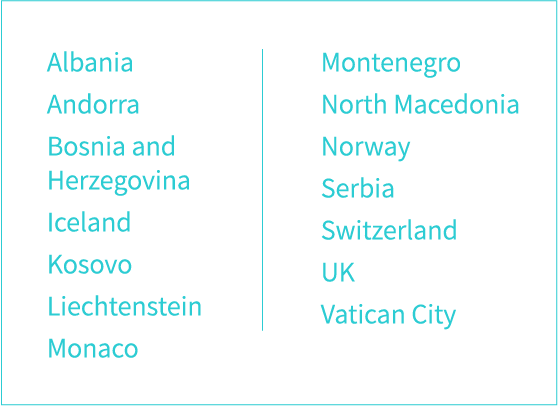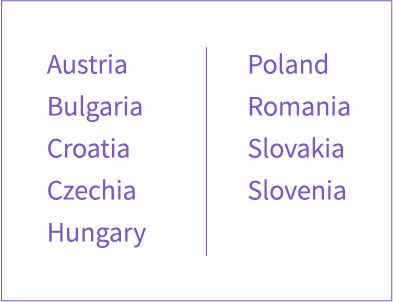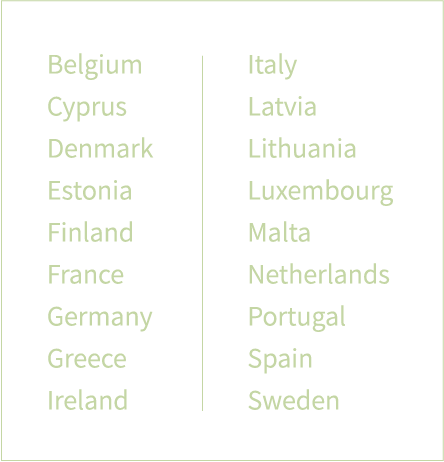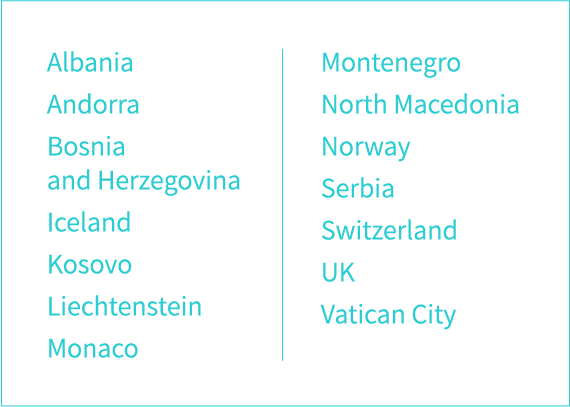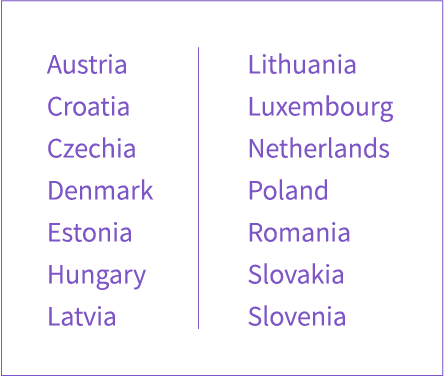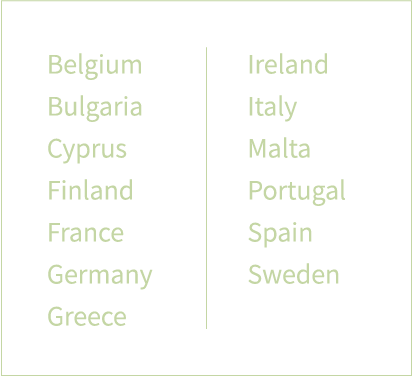Struggles for change


Populist parties, extremists on the left and right, and hostile foreign governments are all likely to exploit grievances and economic vulnerabilities to further their agendas.



Images: Getty Images (Xavier Leoty/AFP; Thierry Monasse; Louisa Gouliamaki; Kiran Ridley; Hollie Adams)
ROLL OVER DOT CATEGORIES TO SHOW SPECIFIC COUNTRIES
EU budget policy
Public debt
Migration
Rule of law
Climate Change
Russia
China
Defence
Western Balkans
Fiscal level playing field

Migration will return to the top of the EU agenda in 2022, with a divide forming between those states that refuse mandatory quotas and those seeking a total overhaul of the system.
DISTRIBUTION SYSTEM FOR REFUGEES



Divided or united?
A plethora of thorny issues will probably drive a wedge between European countries in 2022. From imminent challenges to policy on migration and the rule of law, to longer term strategic issues such
as climate change and defence policy, there is shrinking common ground between European powers. Such divisions will provide ample opportunity for the many political actors across the continent that
seek to change the status quo.
Europe
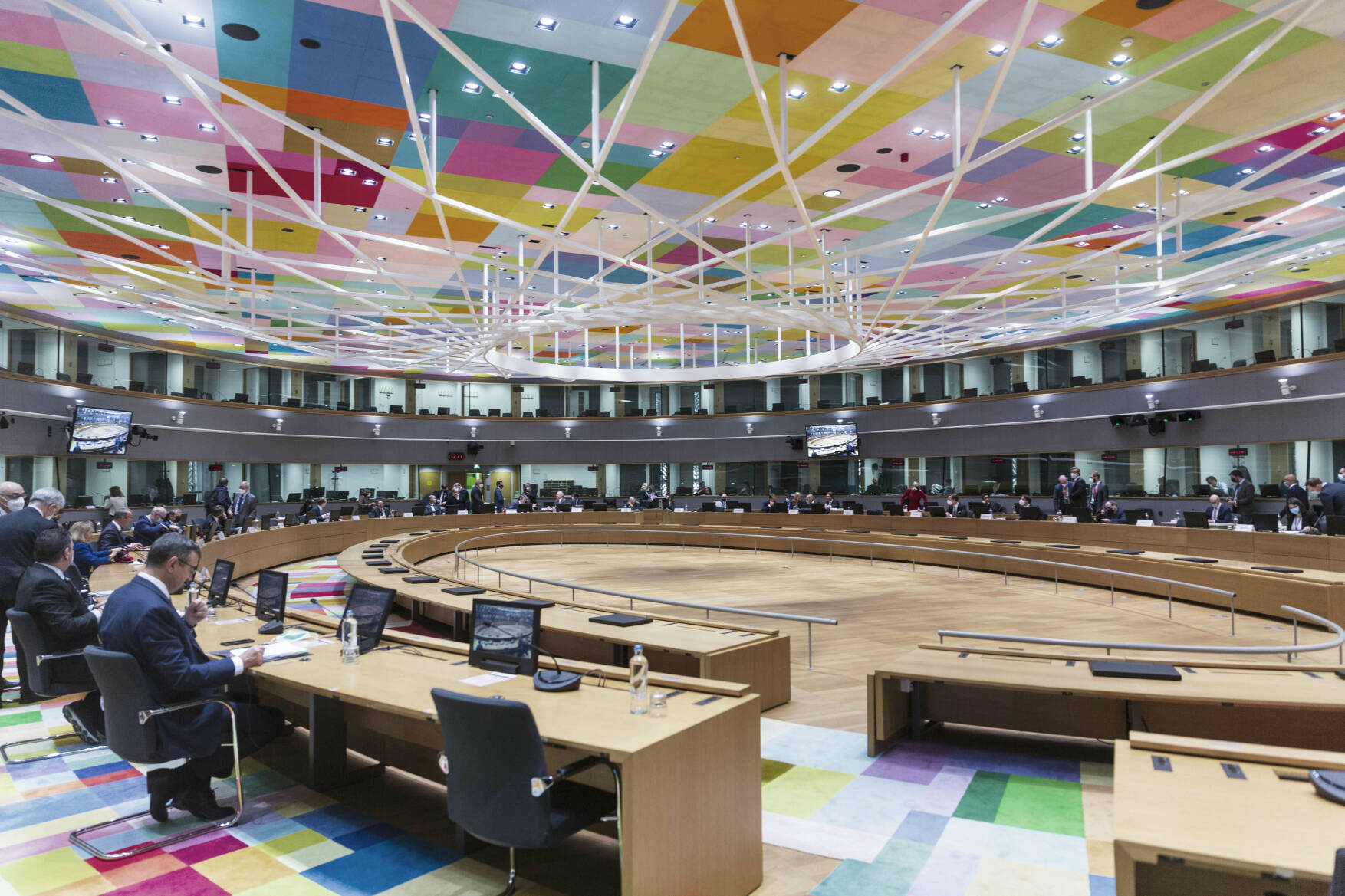
Risk dashboard
Infographic
Assessment
Forecasts
Dates to watch
Key indicators
Struggles
for change
A resurgence of anti-establishment sentiment and agitation in Europe is likely in 2022, amid uneven national recoveries from the pandemic. Weakened economies, public disaffection with mainstream political parties, and a probable rise in immigration will provide opportunities for the many political actors that seek to change the status quo in Europe. Populist parties, extremists on the left and right, and hostile foreign governments are all likely to exploit grievances and economic vulnerabilities to further their agendas.
Europe enters 2022 in a weakened state, albeit with more resilient prospects for economic recovery than many other regions. It is also likely to be a year of relative continuity with little change at upcoming national elections, with the exception of Viktor Orban’s government in Hungary, facing the highest chance of an electoral defeat since 2010. But this does not mean Europe will escape political turbulence. Countries across the continent face multiple threats to their recovery and 2022 is likely to be a year where crises on several fronts will test the EU.
New Covid-19 outbreaks and ongoing disruption to global supply chains, and particularly energy supplies, are the main factors that could derail or slow growth and compound a raft of other issues that threaten discord. These risk factors for Europe as a whole are heavily interconnected to the recovery and stability prospects of other regions, which themselves are pegged to wider negative geopolitical trends and instability.
The increasingly competitive and adversarial nature of international relations, not least between Russia, China and the United States, but also between smaller states in Europe’s near abroad will almost certainly have a direct impact on how Europe fares in the coming year. Eastern European countries, such as Poland, Bulgaria and the Western Balkan states, are particularly vulnerable to crises in 2022 that the EU can ill afford and seems poorly equipped to prevent. >>
Key indicators

Greece-Turkey tensions
The eastern Mediterranean is a potential crisis flashpoint in 2022 amid territorial disputes over gas reserves. The three key issues to track as sources of tensions between Greece and Turkey remain the unification of Cyprus, gas exploration rights, and maritime border disputes. A specific development that would probably lead to naval deployments and risks of confrontation is the exclusion of Turkey from gas production and distribution deals between Israel, Greece and Egypt. This would probably lead to Ankara ramping up provocative exploration operations in Greek waters.

Trade union activism
There was a slump in trade unions’ mobilisation in Europe in 2020 amid widespread lockdowns. Rising unemployment and inflation rates make a sharp rise of industrial activism more likely, particularly as these converge with an easing of Covid-19-related restrictions and furlough schemes. A slower than anticipated economic recovery, with growth levels staying below 1-2%, may lead governments to implement austerity measures that in turn would point to strikes and walk-outs being more likely. Job losses and higher costs for businesses would also make it harder for these to meet demands from unions.

Libertarian terrorism
The growing infusion of libertarian ideologies among radical political movements would push up the potential for violence at demonstrations and acts of terrorism. Extremist groups have been promoting anti-state and anti-globalist ideas catalysing opposition to Covid-19 restrictions and vaccinations. Most actions have been limited to activism and civil disobedience so far. But the tying together of radical ideologies on both the extreme left and right has led to a proliferation of conspiracy theories, and with this, calls for violence against ‘global corrupt political and economic elites’.
CLICK ON FLAGS TO
SHOW INFORMATION























Forecasts
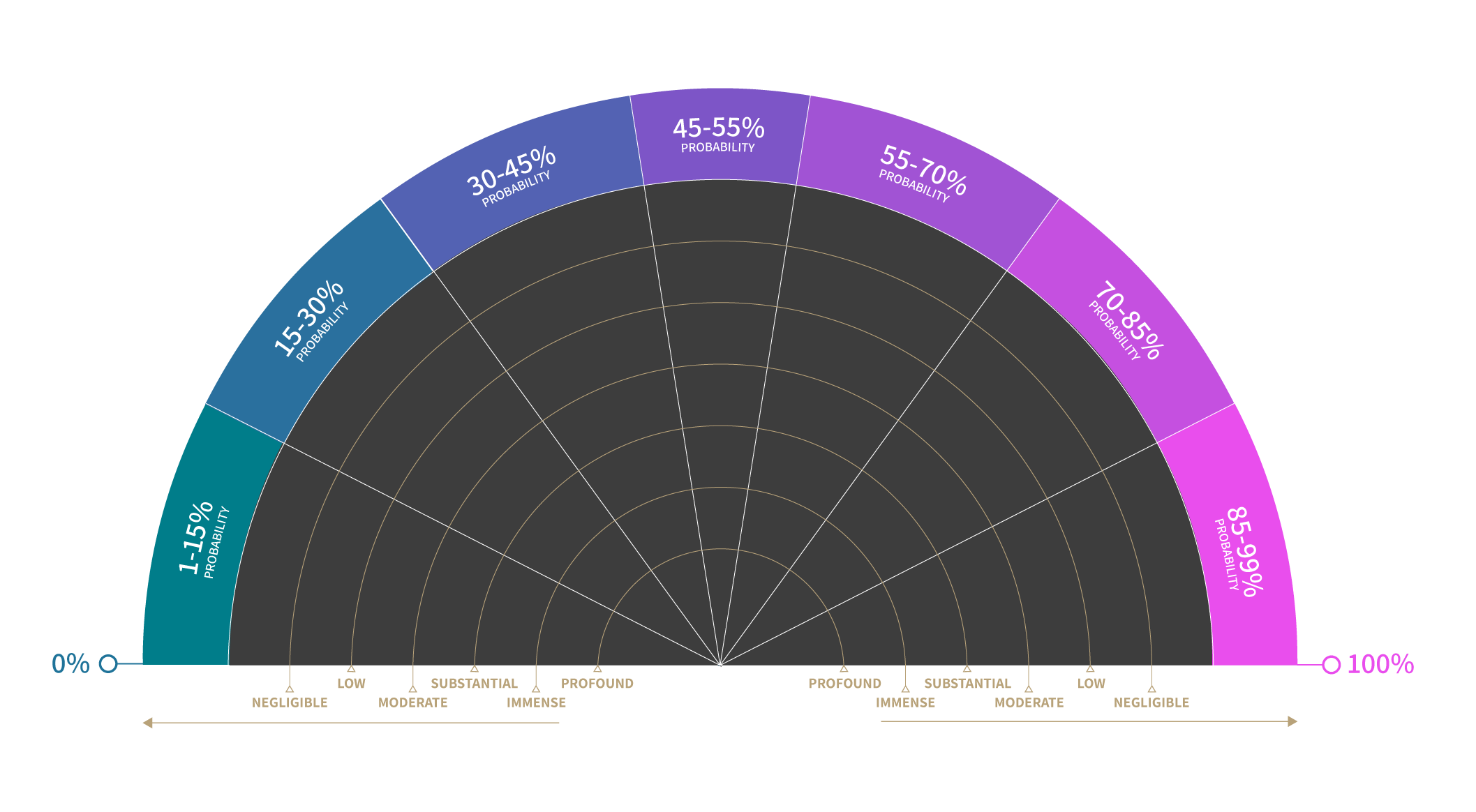




SERBIA
General election
April
EUROPE
Europe Day
8 May
Europe
Eid Al-Fitr
2 May–3 May
Europe
End of Ramadan
1 May
EUROPE
International Worker's Day
1 May
France
Presidential election
– 2nd round
24 April
Europe
Earth Day
22 April
United Kingdom / Ireland
Anniversary of Good
Friday Agreement
15 April
FRANCE
Presidential election
– 1st round
10 April
EUROPE
Start of Ramadan
2 April
France
Legislative elections
– 2nd round
June
Hungary
Legislative elections
April
Europe
Annunciation Day
25 March
AUSTRIA
Presidential election
April
BELGIUM
EU leaders' endorsment of Strategic Compass
March
GERMANY
Munich Security Conference
18 February–20 February
Belgium
EU-AU summit
17 February–18 February
GERMANY
Presidential election
Before 16 February
PORTUGAL
Legislative elections
30th January 2022
FRANCE
Anniversary of the
Charlie Hebdo attack
7th January 2022
France
Legislative elections – 1st round
June
Malta
Legislative elections
June
BOSNIA AND HERZEGOVINA
Presidential election
October
Germany
G7 Summit
Before December
GERMANY
Anniversary of Paris Climate Agreement
12 December
FRANCE
Anniversary of the Bataclan attack
13 November
FRANCE
Anniversary of Samuel
Paty's assassination
16 October
Spain
Anniversary of 2017 independence referendum in Catalonia
1 October
Slovenia
Presidential election
October
Latvia
Legislative elections
October
Bosnia and Herzegovina
Legislative elections
October
Spain
National Day of Catalonia
11 September
Portugal
UN Ocean Conference
in Lisbon
27 June–1 July
SWEDEN
Legislative elections
September
EUROPE
Ashura
7 August–8 August
FRANCE
Anniversary of the 1995 Metro Saint Michel attack in Paris
25 July
FRaNCE
Anniversary of
the Nice attack
14 July
UNITED KINGDOM
Orangemen's Day
12 July
EUROPE
Eid Al-Adha
9 July
Hungary
Referendum on LGBT+ law
Before July
SPAIN
NATO Summit in Madrid
29 June–30 June
Slovenia
Legislative elections
June
FRANCE
Orthodox Christmas Eve
6th January 2022
Dates to watch
Scroll down
Struggles for change


Populist parties, extremists on the left and right, and hostile foreign governments are all likely to exploit grievances and economic vulnerabilities to further their agendas.




A plethora of thorny issues will probably drive a wedge between European countries in 2022. From imminent challenges to policy on migration and the rule of law, to longer term strategic issues such as climate change and defence policy, there is shrinking common ground between European powers. Such divisions will provide ample opportunity for the many political actors across the continent that seek to change the status quo.
Forecasts
Struggles
for change
A resurgence of anti-establishment sentiment and agitation in Europe is likely in 2022, amid uneven national recoveries from the pandemic. Weakened economies, public disaffection with mainstream political parties, and a probable rise in immigration will provide opportunities for the many political actors that seek to change the status quo in Europe. Populist parties, extremists on the left and right, and hostile foreign governments are all likely to exploit grievances and economic vulnerabilities to further their agendas.
Populist parties, extremists on the left and right, and hostile foreign governments are all likely to exploit grievances and economic vulnerabilities to further their agendas.
Europe enters 2022 in a weakened state, albeit with more resilient prospects for economic recovery than many other regions. It is also likely to be a year of relative continuity with little change at upcoming national elections, with the exception of Viktor Orban's government in Hungary, facing the highest chance of an electoral defeat since 2010. But this does not mean Europe will escape political turbulence. Countries across the continent face multiple threats to their recovery and 2022 is likely to be a year where crises on several fronts will test the EU.
New Covid-19 outbreaks and ongoing disruption to global supply chains, and particularly energy supplies, are the main factors that could derail or low growth and compound a raft of other issues that threaten discord. These risk factors for Europe as a whole are heavily interconnected to the recovery and stability prospects of other regions, which themselves are pegged to wider negative geopolitical trends and instability.
The increasingly competitive and adversarial nature of international relations, not least between Russia, China and the United States, but also by smaller states in Europe’s near abroad will almost certainly have a direct impact on how Europe fares in the coming year. Eastern European countries, such as Poland, Bulgaria and the Western Balkan states, are particularly vulnerable to crises in 2022 that the EU can ill afford and seems poorly equipped to prevent.
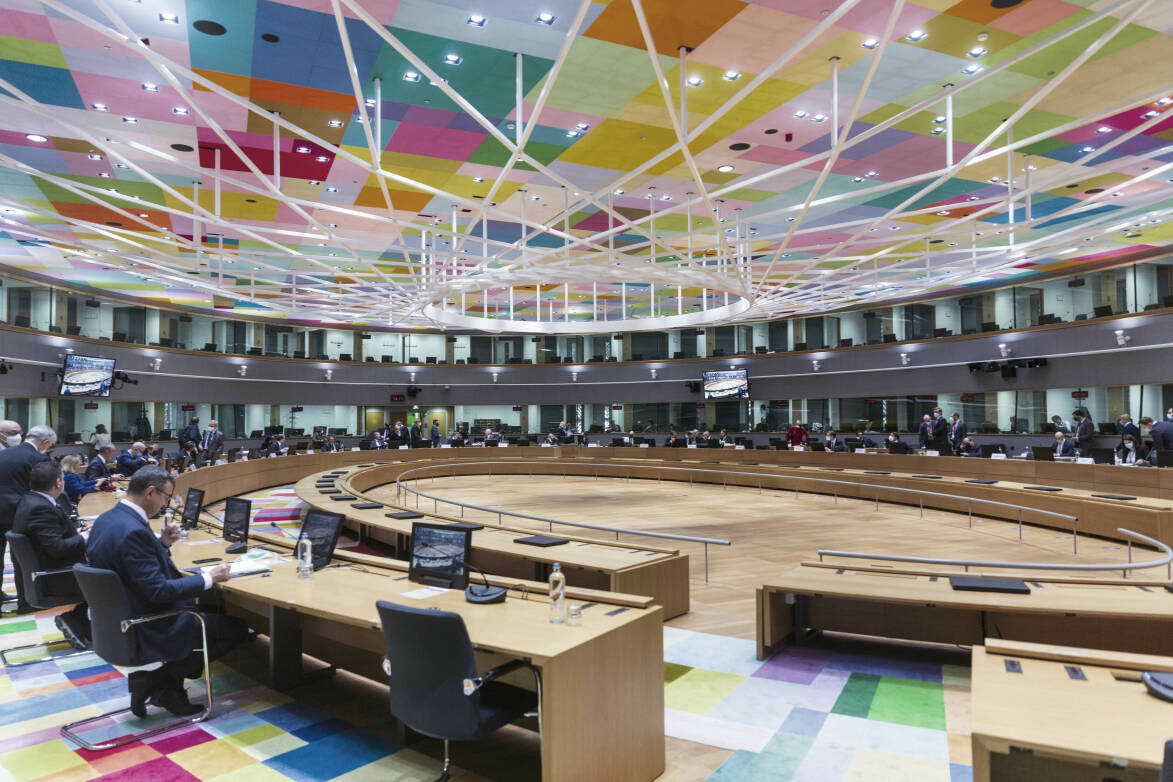

For best results
We recommend that you view this in a desktop browser. If using a tablet or smartphone, some infographics may only respond to device-specific gestures.
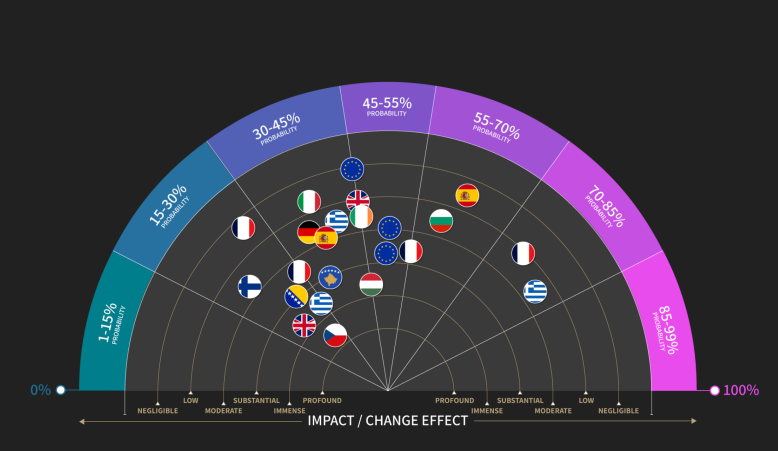
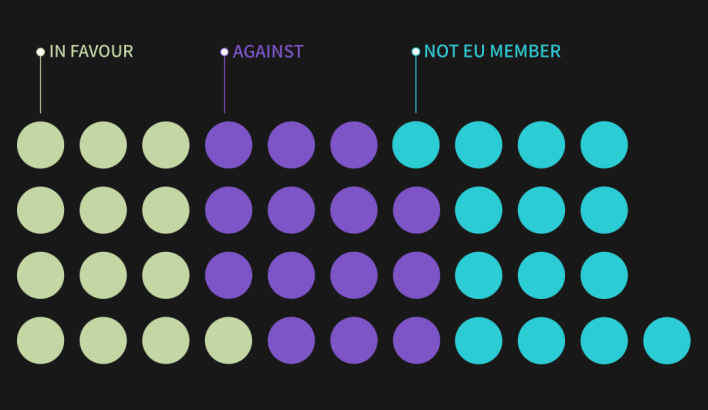


Images: Getty Images (Xavier Leoty/AFP; Thierry Monasse; Louisa Gouliamaki; Kiran Ridley; Hollie Adams)
Key indicators

Greece-Turkey tensions
The eastern Mediterranean is a potential crisis flashpoint in 2022 amid territorial disputes over gas reserves. The three key issues to track as sources of tensions between Greece and Turkey remain the unification of Cyprus, gas exploration rights, and maritime border disputes. A specific development that would probably lead to naval deployments and risks of confrontation is the exclusion of Turkey from gas production and distribution deals between Israel, Greece and Egypt. This would probably lead to Ankara ramping up provocative exploration operations in Greek waters.

Trade union activism
There was a slump in trade unions’ mobilisation in Europe in 2020 amid widespread lockdowns. Rising unemployment and inflation rates make a sharp rise of industrial activism more likely, particularly as these converge with an easing of Covid-19-related restrictions and furlough schemes. A slower than anticipated economic recovery, with growth levels staying below 1-2%, may lead governments to implement austerity measures that in turn would point to strikes and walk-outs being more likely. Job losses and higher costs for businesses would also make it harder for these to meet demands from unions.

Libertarian terrorism
The growing infusion of libertarian ideologies among radical political movements would push up the potential for violence at demonstrations and acts of terrorism. Extremist groups have been promoting anti-state and anti-globalist ideas catalysing opposition to Covid-19 restrictions and vaccinations. Most actions have been limited to activism and civil disobedience so far. But the tying together of radical ideologies on both the extreme left and right has led to a proliferation of conspiracy theories, and with this, calls for violence against ‘global corrupt political and economic elites’.
UNITED KINGDOM
Orangemen's Day
12 July
EUROPE
Start of Ramadan
2 April
Europe
Eid Al-Fitr
2 May–3 May
Europe
End of Ramadan
1 May
EUROPE
International Worker's Day
1 May
France
Presidential election
– 2nd round
24 April
Europe
Earth Day
22 April
UK / Ireland
Anniversary of Good
Friday Agreement
15 April
FRANCE
Presidential election
– 1st round
10 April
SERBIA
General election
April
Hungary
Legislative elections
April
Malta
Legislative elections
June
Europe
Annunciation Day
25 March
AUSTRIA
Presidential election
April
BELGIUM
EU leaders' endorsment of Strategic Compass
March
GERMANY
Munich Security Conference
18 February - 20 February
Belgium
EU-AU summit
17 February–18 February
GERMANY
Presidential election
Before 16 February
PORTUGAL
Legislative elections
30th January 2022
FRANCE
Anniversary of the
Charlie Hebdo attack
7th January 2022
EUROPE
Europe Day
8 May
Portugal
UN Ocean Conference
in Lisbon
27 June–1 July
BOSNIA AND HERZEGOVINA
Presidential election
October
Slovenia
Presidential election
October
Germany
G7 Summit
Before December
GERMANY
Anniversary of Paris Climate Agreement
12 December
FRANCE
Anniversary of the Bataclan attack
13 November
FRANCE
Anniversary of Samuel
Paty's assassination
16 October
Spain
Anniversary of 2017 independence referendum in Catalonia
1 October
Latvia
Legislative elections
October
Slovenia
Legislative elections
June
Bosnia and Herzegovina
Legislative elections
October
Spain
National Day of Catalonia
11 September
SWEDEN
Legislative elections
September
EUROPE
Ashura
7 August–8 August
FRANCE
Anniversary of the 1995 Metro Saint Michel attack in Paris
25 July
FRaNCE
Anniversary of
the Nice attack
14 July
EUROPE
Eid Al-Adha
9 July
Hungary
Referendum on LGBT+ law
Before July
SPAIN
NATO Summit in Madrid
29 June–30 June
FRANCE
Orthodox Christmas Eve
6th January 2022


